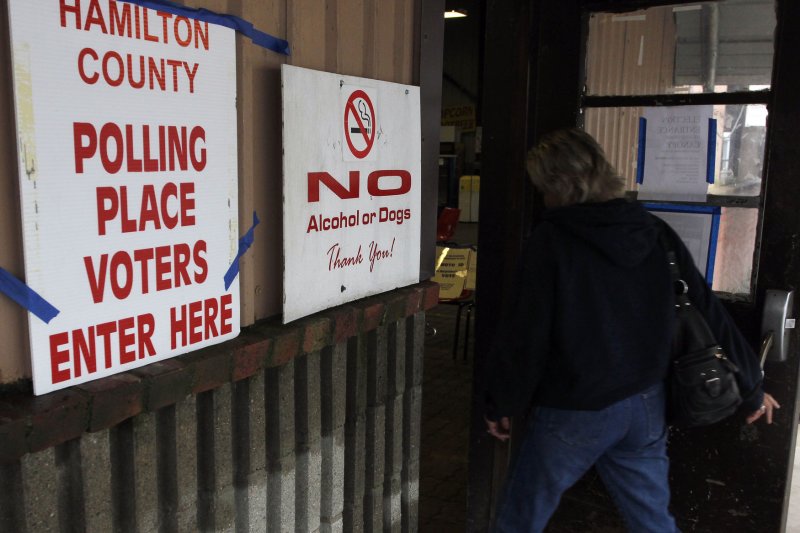A voter enters a precinct in Hamilton County, Indiana, on Tuesday. Republican presidential front-runner Donald Trump looks to score what could be a decisive victory in Indiana that could set him on a path toward securing the Republican nomination before the close of voting in June. Photo by Frank Polich/UPI |
License Photo
INDIANAPOLIS, May 3 (UPI) -- In a presidential campaign that every week deals candidates a do-or-die moment, another of them arrives Tuesday as voters head to the polls in Indiana.
Voters there have the opportunity to hand Republican front-runner Donald Trump a decisive victory that could all-but-ensure he wins the GOP nomination before the end of voting in June. On the flip side, Indiana is a must-win state for his main opponent, Texas Sen. Ted Cruz. If Cruz fails to win the state, he will be largely marginalized in his quest to deny Trump the nomination.
"Honestly, if we win Indiana, it's over. It's finished. They're gone," Trump said at a rally Monday in Carmel, Ind., north of Indianapolis.
He may be right. Trump already has obtained about 80 percent of the delegates needed to clinch the GOP nomination. Most delegate counts have him just shy of 1,000 pledged delegates. He needs 1,237 delegates to win the nomination outright heading into the Republican convention in Cleveland.
On the Republican side in Indiana, there are 57 delegates at stake, the second-largest haul besides California left on the calendar. About half of those delegates, 30, will be awarded on a winner-takes-all basis to the candidate who finishes first in the statewide race. The remaining 27 delegates are awarded on a winner-takes-all basis in each of the state's congressional districts. If Trump can run up a big win, as recent polls suggest he may, in the statewide race, he would be in a strong position to sweep all 57 delegates.
The two most recent polls done in the state show Trump widening his lead to 15 and 17 percentage points, respectively. The RealClearPolitics average of eight polls of Indiana Republicans taken April 13-29 show Trump with a 10.8 point lead.
On the Democratic side, front-runner Hillary Clinton has all but sewn up the Democratic nomination, though polls show her opponent, Sen. Bernie Sanders, is within striking distance of an upset victory in the Hoosier State.
While polls have consistently shown Clinton in the lead, the most recent Marist poll conducted on behalf of NBC News and the Wall Street Journal shows that lead down to just 4 points for Clinton, an amount Sanders could close on Tuesday, making a narrow win possible.
Even if that happens — and even if it continues happening in every single state still left to vote — Clinton will still finish the campaign with a lead in pledged delegates over Sanders.
That's because the Democratic Party awards delegates on a proportional basis, making it almost impossible to score a big win and reverse the trend in the delegate fight, which has leaned toward Clinton ever since Super Tuesday, when she cleaned up in several Southern states and earned a measurable lead in the pledged delegate count.
She has slowly but steadily increased that lead since then, with Sanders winning several smaller contests, but never coming any closer than shouting distance in the delegate race.
While 85 delegates are at stake in Indiana, the reality is just by having her name appear on the ballot, Clinton is assured a delegate haul that will make any nominal advantage gleaned by Sanders moot, given the dwindling number of states still left to vote.
Most of Indiana is in the Eastern time zone, but six counties in the southwest part of the state and six counties in the northwest -- in the region sometimes called "Chicagoland" -- are in the Central time zone. Those 12 counties will see polls close one hour later, at 7 p.m. Eastern, while polls in the rest of the state close at 6 p.m. Eastern.















